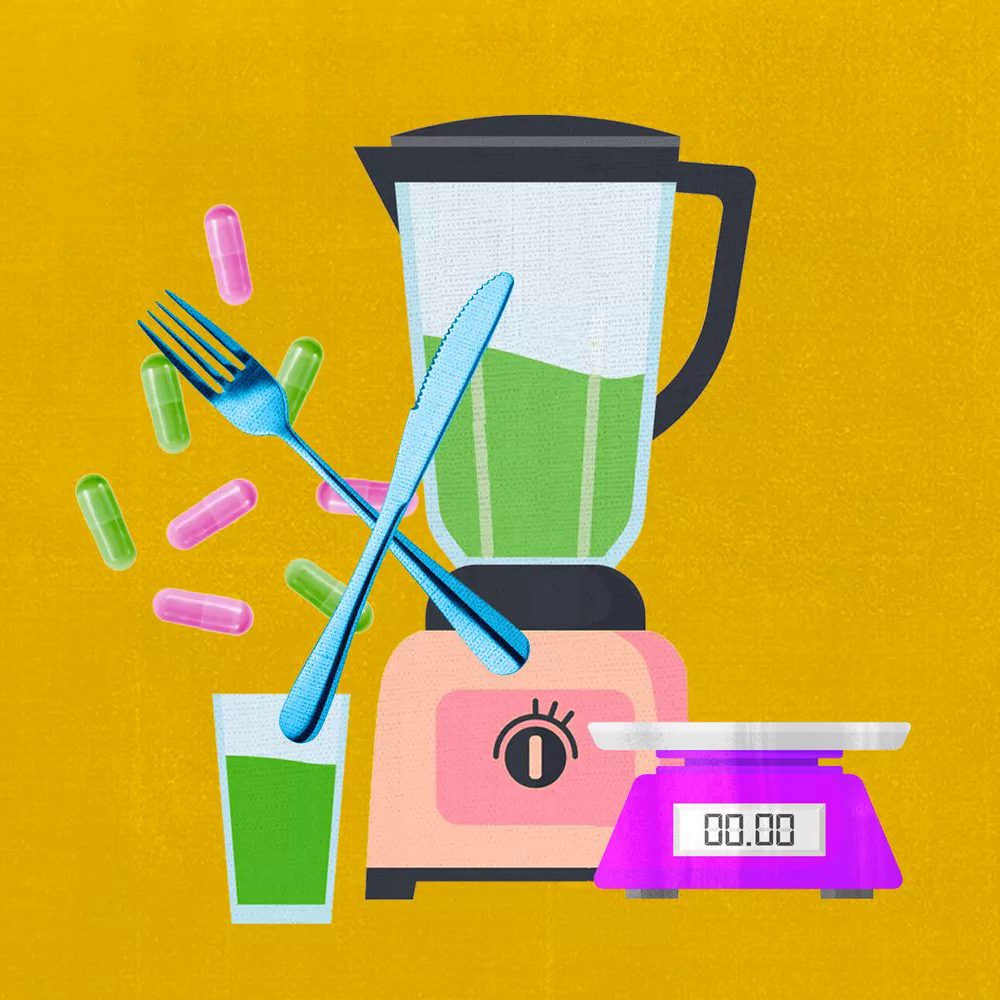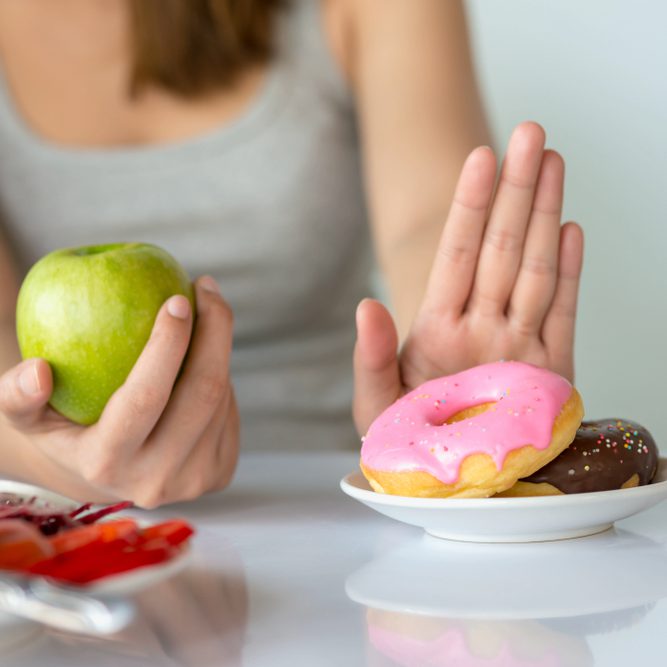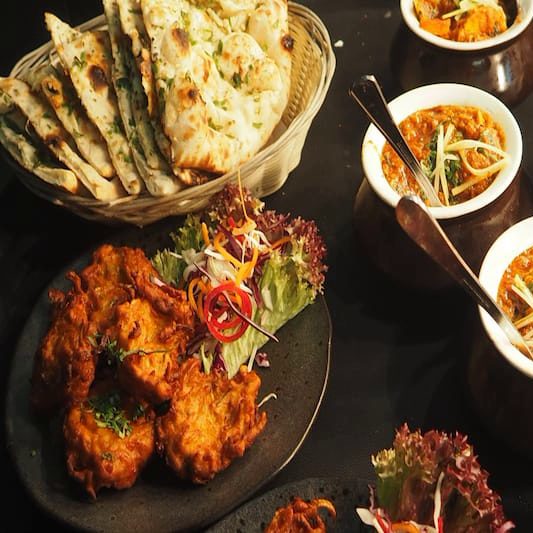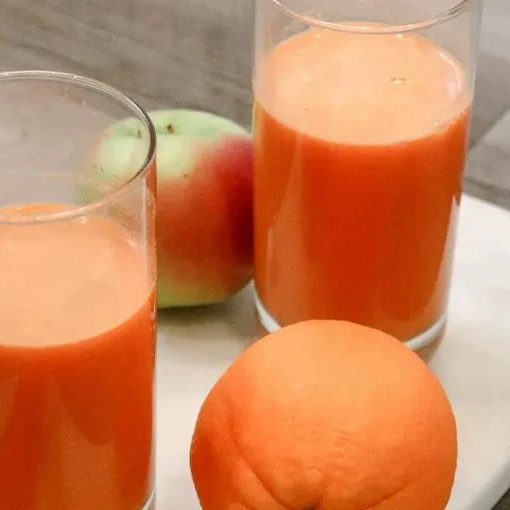Many people are eager to try the latest diet and wellness trends in search of a healthier version of themselves. Despite what self-proclaimed wellness experts, including social and internet influencers and celebrities, swear by, many of these trends won't yield promised results we're looking for. Increasingly, social media is responsible for the spread of health-related misinformation that may be incomplete, inaccurate or false. Following these unsubstantiated trends could even be downright dangerous and should be avoided.
Here are some of the top dieting and wellness trends that should be avoided.
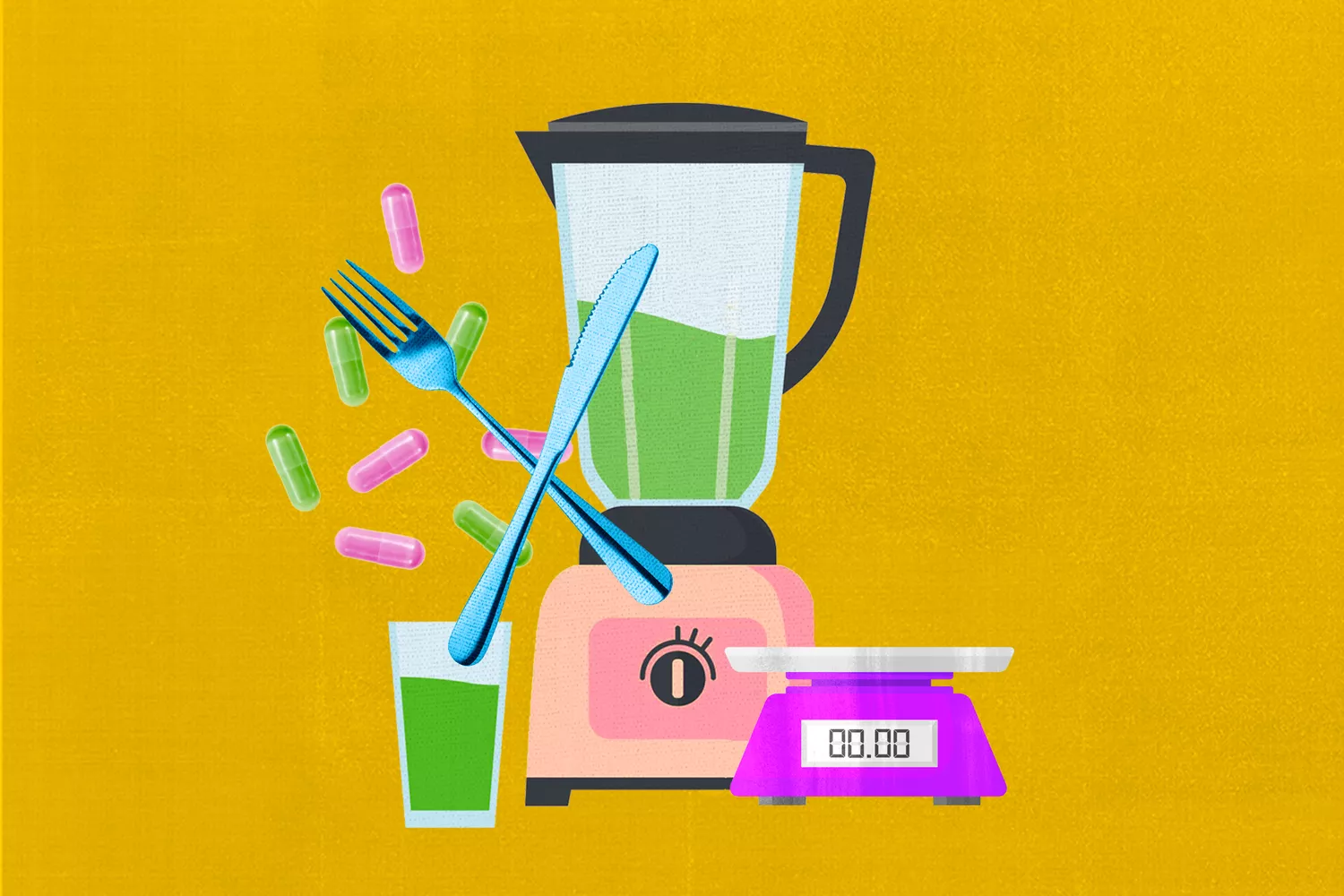 Design elements: Getty Images. Collage: Cassie Basford
Design elements: Getty Images. Collage: Cassie Basford
1. Strict Calorie Counting & Nutrient Tracking
Strict calorie counting is the practice of tracking the number of calories consumed using an app or point system, usually with the goal of consuming fewer calories in order to lose weight. Calorie counting can also take various forms, such as measuring or weighing your food or counting macros. Macro counting is the practice of counting up the grams of macronutrients (carbohydrates, proteins and fats) in order to hit a specific target for each meal or day.
Counting calories can lead to an unhealthy obsession with food and disordered eating behavior. Research published in 2017 in Eating Behaviors shows that usage of calorie-tracking apps can potentially activate, maintain or exacerbate eating-disorder-related attitudes and behaviors. "One of the most concerning things that I often see is people trying to count calories, but they're trying to stick to an unrealistic number of calories for the day. I've seen way more TikToks than I can count where someone is eating under 1,000 calories a day, which is actually dangerous to your body's metabolism and ability to function normally," says Jamie Nadeau, RDN, a registered dietitian nutritionist and founder of The Balanced Nutritionist.
"This leads to undereating which then leads to bingeing, feeling out of control around food, and feeling like they're 'failing' their diet when, really, they're underfueling their body," says Nadeau.
2. Use of Diuretics and Laxatives
Diuretics and laxatives are substances indicated for some health ailments such as fluid retention and constipation. However, diuretics and laxatives are also commonly used for quick weight loss. While they work differently, both temporarily reduce weight by ridding the body of water. Diuretics work in the kidneys to essentially force more pee out of your body, while laxatives work in the colon by drawing more water into your poop. Since only water weight is lost, a person will regain the weight as soon as they drink more water.
While you may experience temporary weight loss, regular use of diuretics and laxatives can lead to longer-term complications and even death. Some of the side effects include severe dehydration, electrolyte imbalance, vitamin deficiencies, organ damage and cardiac arrest, per a 2019 publication in Cardiovascular Drugs and Therapy. "Unless you have a medical reason to use diuretics or laxatives, they should be avoided at all costs," says Wendy Lord, RDN, a registered dietitian nutritionist. "They interfere with the normal functioning of your body and can lead to nutrient deficiencies."
3. 1,200-Calorie Diets
You have probably heard of the 1,200-calorie diet for weight loss, but is it really beneficial for your health? According to the 2020-2025 Dietary Guidelines for Americans, adult females need an estimated 1,600 to 2,000 calories per day, while adult males need 2,000 to 2,400 calories, depending on how active they are, plus other factors. The guidelines for children up to 8 years old range from 1,200 to 1,400 calories.
"This low energy intake is simply not enough for an adult. In actuality, 1,200 calories is roughly the caloric requirement of a toddler!" says Anastasia Gialouris, RD, a registered dietitian from Brooklyn. In the long run, such a low-calorie intake can actually do more harm than good, she says, "When our bodies are not being fed enough, they go into 'starvation mode' and actually hold on to body fat out of fear of not having enough food. So, if fat loss is your goal (which it most likely is if you're on a calorie-restricted diet) you are essentially self-sabotaging your goal."
Furthermore, very-low-calorie diets, such as the 1,200-calorie diet, generally result in rapid and substantial weight regain. Studies show that many individuals who lose weight on a very-low-calorie diet will regain the weight lost and might even end up at a higher weight than when they began the diet. "Your metabolism slows down, which can not only make weight loss even harder, but also negatively impact digestion, energy levels and several other bodily functions," says Gialouris.
Additionally, when a person doesn't see "results" when following a 1,200-calorie diet, they often double-down on maintaining that level of intake or reducing it further, leading to more drastic metabolic and behavioral consequences, including bingeing or engaging in binge/purge behavior.
4. One-Food Diets
A one-food diet, sometimes referred to as a mono diet, involves eating only a single food or consuming that food at every meal for several days or weeks. One of the best-known single-food diets may be the grapefruit diet, which was popularized in the 1930s on the basis that an enzyme found in grapefruit helps to speed metabolism and drop pounds. Other variants include the cabbage soup diet, garlic diet and grape diet. Many of the foods promoted in mono diets are high in water content, which may help you feel fuller, but ultimately they'll be unsatisfying as they are low in calories, fat and protein. As with any restrictive diet, a mono diet tends to be very low in calories and, if followed long-term, may lead to nutritional deficiencies and may potentially cause digestive and psychological disorders, per a 2021 publication in Metode Science Studies Journal.
5. Weight-Loss Supplements
The global weight-loss supplement industry was valued at $33.4 billion in 2020 and is forecasted to continue growing rapidly. With so many supplements out there, you might be tempted to try one, hoping it just might be the magic bullet. However, before taking any supplement, it's important to know that there are risks involved: The supplement industry is largely unregulated, which allows for false or misleading claims, contamination, fraudulent labeling, substitute ingredients and even experimental, synthetic, banned or prescription drugs under the guise of a "proprietary blend." An analysis of dietary supplements from 2007 to 2016 found 776 dietary supplements promoting weight loss contained unapproved pharmaceutical ingredients, of which 20% contained one or more unapproved prescription ingredients, 57% contained diuretics, stimulants and other banned or never-FDA-reviewed drugs, and 178 included synthetic drugs.
"I don't recommend weight-loss supplements or prescribed medication for my weight-loss clients. Weight-loss supplements are not regulated by the FDA, so they frequently contain inadequately tested ingredients that can have harmful effects on your body. Many weight-loss supplements are backed by poor research and don't do what they claim to do. Taking them in large enough quantities to result in weight loss can cause high blood pressure, stroke or heart attack," says Lord. “If medication is indicated, I will refer them to their doctor for the appropriate prescription.”
6. Avoiding Cultural Foods
When you Google "healthy food," what comes up? Generally, you'll get pictures of salads, quinoa and acai bowls, and plates resembling USDA's MyPlate. This Eurocentric, narrow definition of "healthy" food may leave you wondering where cultural foods can fit into healthy eating.
For most people, food is cultural, not solely nutritional. This doesn't make cultural foods "unhealthy" by any means. In fact, it has often been demonstrated that, in many areas of the world, people can live completely healthy lives and prepare and consume a variety of delicious and nutrient-dense foods despite the fact that, according to American or Western standards, their nutrition is inadequate.
Cara Harbstreet, M.S., RD, of Street Smart Nutrition, says, "If cultural foods were genuinely unhealthy, we wouldn't need constant reminders telling us such. American-centric food and health practices are not the pinnacle of wellness, and the insistence that [they are] displays several pillars of white supremacy culture, [per experts] Tema Okun and Kenneth Jones. If there were indeed concerns about the healthfulness or intrinsic value of cultural foods, we simply wouldn't see them persist through generation after generation within those cultures."
Further, nutrition isn't the only reason for us to eat cultural foods. "Cultural foods, in particular, can serve as a means of connection to ancestors, countries of origin, religious or spiritual practices, to name a few," says Harbstreet, "Additionally, we must widen our lens to consider how built environments, structural racism and the continuous marginalization of multi-ethnic and immigrant communities makes it difficult to access some of the foods we most commonly associate with 'healthy eating' in America."
7. Eliminating a Food Group
There's a reason why the food groups are called "essential nutrients." They are needed by the body for normal and healthy functioning. So when you eliminate an entire group of foods, you put your body at risk of nutritional deficiencies. However, many trendy diets can call for limiting or eliminating entire food groups, such as the keto diet, which is a very-low- or no-carb diet.
"The biggest reason I advise against eliminating a food group (such as carbs or fats) is that it fosters an unhealthy relationship with food, which can eventually promote disordered eating. By labeling food, as we do by saying "this food is bad and I shouldn't eat it," we are connecting that food to fear and guilt, and that is never something we should aim for," says Gialouris. "This can further progress into a "binge-restrict cycle" in which you cut out a whole list of foods (restrict), which are most likely foods you love."
Gialouris adds, "I find that this usually stimulates increased cravings and obsessive thoughts about food. The psychological stress that comes from avoiding and fearing a certain food is honestly more unhealthy than the actual food itself."
Additionally, after years of following various and often conflicting food-group-elimination diets, you may develop an ever-growing list of forbidden foods, leaving you with few food options and increasing stress around eating foods of varying nutrient or calorie densities.
8. Clean Eating
While there's little scientific research or consensus on the definition of "clean eating," this diet trend generally promotes a diet that is free from additives, artificial sweeteners, pesticides/chemical applications during growing or production, antibiotic use (for animal proteins), or other ingredients perceived as "chemicals." Furthermore, "clean eating" may also focus on plant-based diets and limiting packaged and processed foods. Many clean-eating websites and social media wellness influencers are becoming increasingly popular as sources of nutrition information.
"The American food system is one of the most highly regulated in the world, and our food supply is safe to consume when cooked and eaten as suggested. However, fear-mongering headlines and proclamations from wellness influencers with little credibility would have you believe otherwise. This narrative sows fear among a vulnerable population: people who care deeply about their health and want to live out their personal values but are misinformed or under-informed about where food comes from and what truly influences health. In my opinion, it's a very predatory practice. The public illusion of 'clean eating' on social media rarely shows what it really takes-financial means, free time and, often, genetics and a level of social capital that disproportionately favors white, young, conventionally attractive and non-disabled people," says Harbstreet, "The implication of 'clean eating'-and really, any diet trend that gains traction-is that if you eat like me and live like me, you can look like me. And that's alluring for many reasons, which is the foundation on which these influencers maintain their status."
"In the modern vernacular, 'clean eating' is also used as a social signal, letting others know you're performing or modeling a way of eating that prioritizes wellness. The reality, however, is simple: by doing something as simple as washing fresh produce, you're already eating 'clean,'" says Harbstreet.
9. Detox Diets
Detox diets or programs suggest that they are methods that will remove toxins, cleanse the body and promote health and weight loss. Programs may include fasting, drinking only juices, eating only certain foods, using dietary supplements or herbs, cleansing the colon through enemas, laxatives or hydrotherapies, or use of a sauna. Are these programs necessary for health?
"Your body has a built-in, very efficient detox system. Waste products and toxins are removed from your body through your feces, urine, sweat and breath. Although eating a nutrient-dense diet will provide the nutrients your body's detoxification pathways rely on, there is no such thing as a detox diet," says Lord.
While some "detox" diets result in short-term weight loss due to low intake of calories, many are falsely advertised and could be dangerous or harmful to your health. According to the National Institutes of Health, the Food and Drug Administration and the Federal Trade Commission have taken action against several companies selling detox programs for containing illegal, harmful ingredients, marketed with false claims of treating diseases, and unapproved for their directed use.
The Bottom Line
Before diving into the next wellness trend, it's important to understand that many products or regimens that influencers and celebrities are touting are not science-based. Many wellness products may have false claims and include ingredients that are not regulated or well-researched. Any restrictive diet trends may be dangerous for your physical, mental and emotional health, with potential harms including but not limited to disordered eating behaviors, vitamin deficiency, organ damage and even cardiac arrest. Despite the popularity of these trends, it's time to move away from them ASAP.
REF: https://www.eatingwell.com/article/8018205/outdated-dieting-trends-that-need-to-be-retired/



